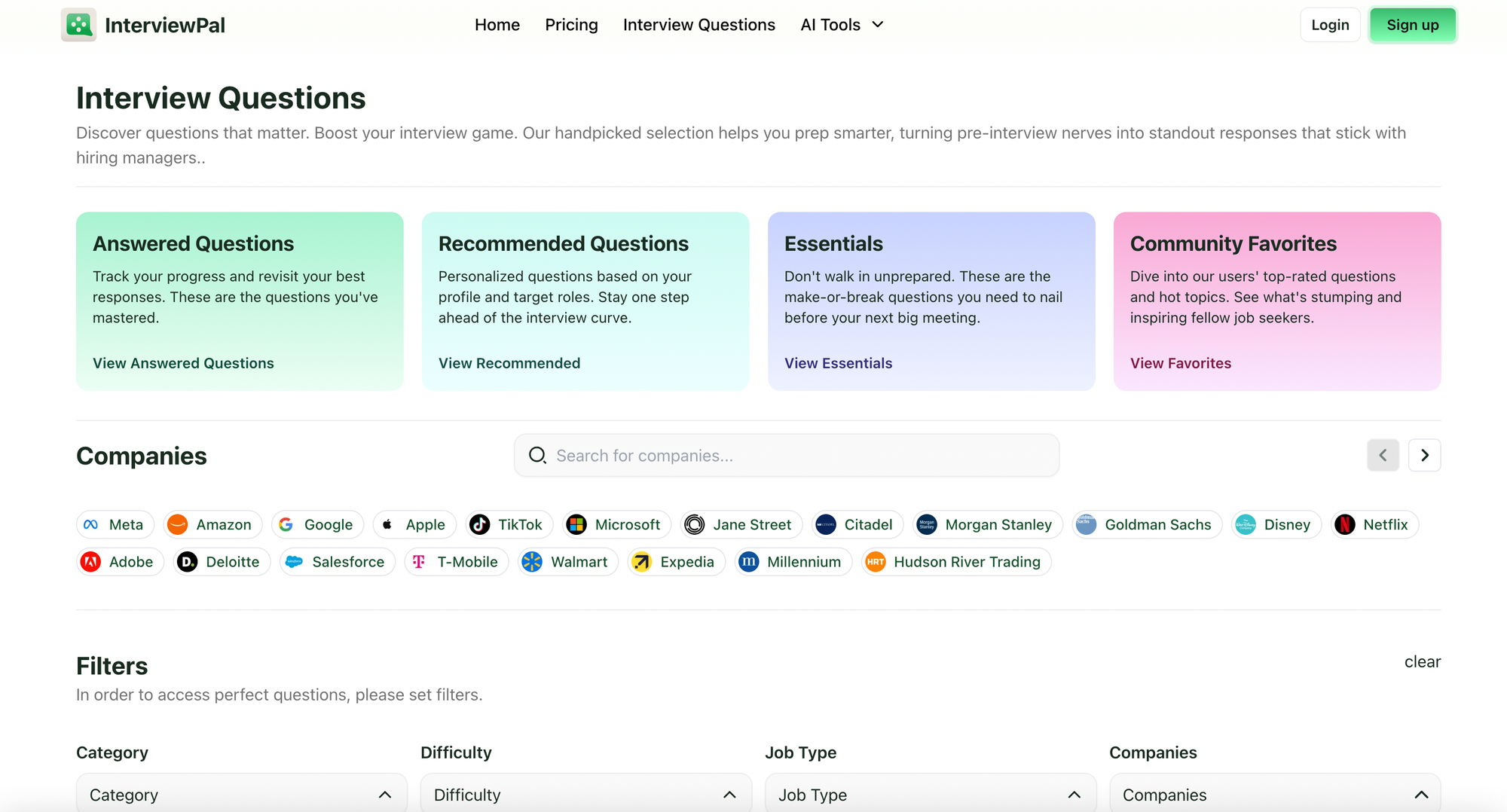In today's hyper-competitive job market, companies aren't just looking for skilled workers—they're searching for impact players. When interviewers ask, "How do you ensure your work is impactful?" they're probing far deeper than your ability to complete tasks. They're assessing your potential to drive meaningful change and deliver measurable results that advance organizational goals.
This seemingly straightforward question has become a crucial differentiator in interviews at companies like Meta, Amazon, and Microsoft. Why? Because impact players are the secret weapon of high-performing organizations, and identifying them during the interview process has become a strategic imperative.
Let's dive into how to craft a compelling response that showcases your impact mindset and demonstrates your value as a potential hire.
What Interviewers Really Want to Know
When hiring managers pose this question, they're evaluating several critical factors:
- Your understanding of what constitutes meaningful impact in a professional context
- Your ability to align individual contributions with broader organizational objectives
- Your approach to measuring and quantifying success
- Your capacity for strategic thinking and prioritization
- Your track record of delivering results that matter
The IMPACT Framework: A Strategic Approach to Your Answer
To help structure your response, we've developed the IMPACT framework—a comprehensive approach that addresses all the key elements interviewers are looking for:
I - Identify Strategic Priorities
Start your answer by demonstrating how you consistently align your work with organizational priorities. Here's how to approach this:
"In my current role at [Company], I begin each quarter by reviewing our team's objectives and key results (OKRs) and mapping my projects directly to these goals. For example, when our company prioritized increasing customer retention by 25%, I restructured my product development roadmap to focus on features that directly addressed user pain points identified through our churn analysis."
Pro Tip: Always connect your individual work to larger business objectives. This shows you think strategically and understand the bigger picture.
M - Measure What Matters
Explain your approach to defining and tracking success metrics:
"I believe that impactful work starts with clear, measurable objectives. For every major initiative I lead, I establish specific KPIs aligned with business goals. Recently, I implemented a new customer onboarding process and tracked multiple metrics, including time-to-value, customer satisfaction scores, and early retention rates. This data-driven approach helped us improve our 30-day retention by 40%."
Pro Tip: Use specific numbers and percentages whenever possible. They provide concrete evidence of your impact and make your answer more memorable.
P - Prioritize and Plan
Detail your methodology for prioritizing work and ensuring maximum impact:
"I use a modified version of the ICE framework (Impact, Confidence, Ease) to prioritize my work. For each potential project, I assess:
- Potential impact on key business metrics
- Confidence in our ability to execute successfully
- Resource requirements and timeline
This systematic approach helped me identify and champion a billing system optimization project that reduced payment processing costs by 15% while improving customer satisfaction scores."
A - Act with Accountability
Demonstrate how you take ownership of outcomes:
"I believe impact comes from taking full ownership of outcomes, not just completing tasks. In my previous role, I noticed our team was hitting all our development deadlines, but user adoption of new features was below expectations. I took the initiative to establish a bi-weekly feedback loop with our user research team and implemented changes based on their insights. This resulted in a 60% increase in feature adoption rates within three months."
C - Collaborate for Greater Impact
Highlight how you maximize impact through effective collaboration:
"I've learned that the greatest impact often comes from leveraging diverse perspectives and skills. When leading our market expansion project, I established cross-functional working groups with members from sales, marketing, and product teams. This collaborative approach helped us identify opportunities we might have missed in silos and led to a successful launch that exceeded revenue targets by 30%."
T - Track and Iterate
Explain how you continuously improve and optimize for impact:
"I maintain a personal impact dashboard that tracks both quantitative metrics and qualitative feedback. Every month, I review this dashboard to identify areas for improvement and adjust my approach accordingly. This continuous improvement mindset helped me optimize our team's code review process, reducing average review time by 40% while maintaining quality standards."

How to Craft Your Response to Different Industries?
The impact question requires different emphasis depending on your industry:
Technology
Focus on:
- Technical innovations that solved significant problems
- Performance improvements and optimization
- User adoption and engagement metrics
- System reliability and scalability achievements
Sales and Marketing
Emphasize:
- Revenue growth and pipeline development
- Market share increases
- Customer acquisition costs
- Brand awareness metrics
- Campaign performance data
Operations and Project Management
Highlight:
- Process efficiency improvements
- Cost savings
- Timeline optimization
- Resource utilization
- Quality metrics
What You Should Avoid:
- Being Too Vague Don't say: "I make sure my work adds value to the company." Instead say: "I increased customer lifetime value by 25% through targeted retention initiatives."
- Focusing Solely on Personal Achievement Don't say: "I consistently exceed my individual targets." Instead say: "I helped my team increase overall productivity by 30% by implementing new collaboration tools and workflows."
- Neglecting the Long-term View Don't say: "I complete all my projects on time." Instead say: "I prioritize initiatives that drive sustainable growth, like our customer education program that reduced support tickets by 40% while improving satisfaction scores."
Crafting Your Signature Impact Story
To make your answer memorable, develop a signature impact story that follows this structure:
- Context: Briefly describe the situation and challenges
- Action: Detail your strategic approach and specific actions
- Impact: Share quantifiable results and broader implications
- Learning: Discuss insights gained and how they inform your current approach
The Follow-up Strategy
Be prepared for these common follow-up questions:
- "Can you provide another example of your impact in a different context?"
- "How do you handle situations where your impact isn't immediately measurable?"
- "What's your approach when initiatives don't deliver the expected impact?"
The impact question is your opportunity to demonstrate that you're not just a capable professional, but a strategic thinker who delivers meaningful results. By using the IMPACT framework and backing your claims with specific examples and metrics, you'll show interviewers that you understand what truly matters in business and how to achieve it.
Remember: The best answers combine strategic thinking, measurable results, and a clear demonstration of your ability to align individual contributions with organizational success. Practice articulating your impact stories using this framework, and you'll be well-prepared to impress even the most demanding interviewers.
Want to practice your response? Try recording yourself and assess whether your answer includes specific examples, quantifiable results, and a clear connection to business objectives. The more you practice, the more natural and compelling your response will become.
To truly stand out at your target company, you need to practice with real interview questions that reflect their specific culture and values. That's where InterviewPal comes in. Our extensive question bank features actual behavioral questions used by top companies worldwide, curated through rigorous research and real candidate experiences.
Unlike generic interview prep platforms, we offer company-specific question sets that help you understand the unique perspectives and priorities of your desired employer. Whether you're targeting tech giants like Google and Amazon or innovative startups, our platform provides access to thousands of verified interview questions, complete with detailed guidance on crafting compelling responses.
Don't leave your interview success to chance. Start practicing with InterviewPal's comprehensive question bank today and approach your next interview with the confidence that comes from preparing with the best resources in the market. Your dream job is waiting – and we're here to help you secure it.



